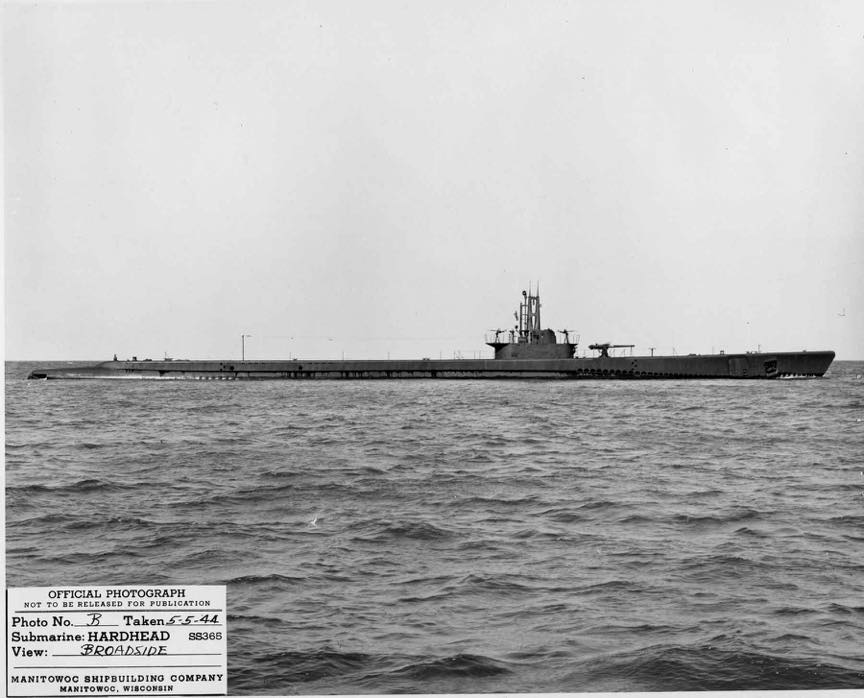Hardhead SS-365

Hardhead
A fish of the croaker family.
(SS-365: dp. 1,526; 1. 311'9"; dr. 15'3"; s. 21 k.; colt 66; a. 10 21" tt., 1 5", 1 40mm., 1 20mm., 2 .50 car.; cl.Balao )
Hardhead (SS - 65) was launched by Manitowoc Shipbuilding Co., Manitowoc, Wis., 12 December 1943; sponsored by Mrs. E. F. McDonald; and commissioned 18 April 1944, Comdr. F. McMaster in command.
Following shakedown training in Lake Michigan the submarine entered a floating dry dock at Lockport, Ill., and was towed to New Orleans, where she arrived 16 May l9M. Hardhead got underway from Algiers, La., 22 May and arrived Balboa, Canal Zone, 5 days later. There she took part in additional training exercises before her arrival at Pearl Harbor 7 July 1944.
Hardhead departed on her first war patrol 27 July and proceeded to her patrol area off the Philippines. Early 18 August she detected Japanese cruiser Natori east of San Bernardino Strait, and closed for a surface attack. The first well directed salvo stopped the cruiser dead in the water; a second sank her to the bottom. During the remainder of her first patrol Hardhead rendered lifeguard services during strikes by fleet aircraft on the Philippines and operated with a reconnaissance line during the Palaus operation. She arrived Fremantle, Australia, 26 September 1944.
Hardhead's second patrol began as she departed Fremantle 24 October and set course for the Philippines. While steaming on the surface through the Sulu Sea October she discovered a life raft adrift. In it was Commander In it was Rear Admiral Bakutis, fighter squadron commander of Enterprise, who had been in the water for 6 days after being shot down during America's smashing victory In the Battle for Leyte Gulf. Operating in a coordinated group with Growler and Hake, the submarine sighted a large cargo ship with escorts 8 November, After being driven oft in one attack, Hardhead aggressively gained an ahead position and sank Manei Maru. It was during this attack that Growler was lost. Hardhead performed lifeguard duty off Subic Bay in November and on the 25th came upon an escorted merchant ship. She sank a coast defense vessel, damaged the merchantman, and evaded a retaliatory depth charge attack. Soon afterward, the submarine returned to Fremantle, ending another skillful and effective patrol 5 December.
Putting to sea again 24 December, Hardhead began her third war patrol in the South China Sea. Operating with Besugo and Blackfin, Hardhead damaged several ships before sinking Nanshin Maru 2 February 1945. Following lifeguard duty for the B-29 strikes on Singapore she returned to Fremantle 15 February.
Hardhead's fourth war patrol~included a special mine laying mission. She sailed 20 March 1945 and laid mines off French IndoChina during the night of' 2 April. The submarine then entered the Gulf' of Siam, where after several attacks she sank cargo ship Araosan Maru 6 April. Following a visits to Subic Bay to reload 11-15 April she patrolled the South China Sea, but found few contacts. American submarines had by this time reduced Japanese merchant activity to a trickle. The island nation was doomed. Hardhead returned to Fremantle 16 May.
Sailing from Fremantle 18 June, Hardhead began her fifth war patrol, to be conducted in the Java Sea. She severely damaged a freighter with her deck guns 22 June, and next day sank four coast-al defense craft during an attack on Ambat Roads with Bullhead. Illness of her Commanding Officer forced Hardhead to end her fifth patrol 17 July at Onslow, Australia.
The submarine departed Onslow on her sixth and last patrol 18 July, and headed back into the Java Sea. She forced a merchant ship to bench 27 July but found few targets and returned to Subic Bay 10 August. Soon afterward the Pacific war, in which the submarine had played an aggressive and important part, ended. Hardhead sailed 31 August and arrived San Francisco via Pearl Harbor 22 September 1945. She decommissioned 10 May 1946 and entered the reserve fleet at Mare Island.
Hardhead was placed in commision in reserve 6 February 1952 and upon her arrival at New London for conversion was placed out of commission. Following her "guppy" conversion, including streamlining, installation of a snorkel breathing apparatus, and larger storage batteries, the submarine recommissioned 24 March 1953. She joined the Atlantic Fleet for training exercises and tactical drills in the years that followed, operating mainly in the Caribbean and off the East Coast of the United States. She sailed for the Mediterranean 7 September 1956 to strengthen the 6th Fleet during the Suez crisis.
In July 1958 Hardhead Joined Submarine Development Group 2, turning her attention from fleet operations to research and testing of equipment and tactical doctrine. She operated off the East Coast and in the north Atlantic and by 1961 had won four consecutive "E" awards for her performance. Hardhead continued through 1967 to perform this vital work in maintaining the technical superiority and readiness of the fleet
Hardhead received six battle stars for World War II service. All six of her combat patrols were successful.
